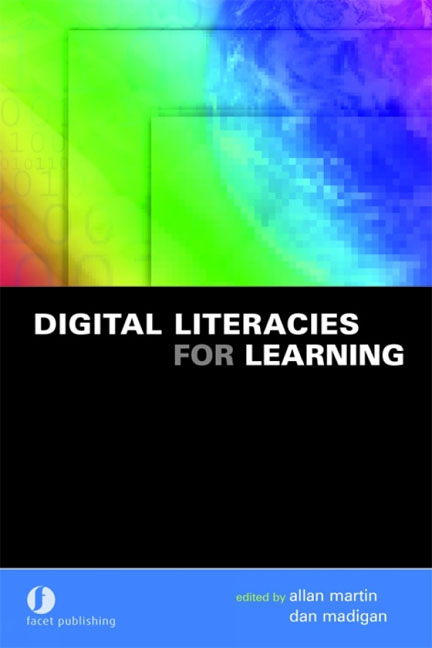Book contents
- Frontmatter
- Contents
- Dedication
- The contributors
- Foreword
- Preface
- Part I Literacies in the digital age
- 1 Literacies for the digital age: preview of Part 1
- 2 Learners, learning literacy and the pedagogy of e-learning
- 3 Real learning in virtual environments
- 4 Digital fusion: defining the intersection of content and communications
- 5 Literacy and the digital knowledge revolution
- 6 Understanding e-literacy
- 7 Information literacy – an overview
- 8 Contemporary literacy – the three Es
- 9 Reconceptualizing media literacy for the digital age
- 10 Literacy, e-literacy and multiliteracies: meeting the challenges of teaching online
- 11 Graduate e-literacies and employability
- Part II Enabling and supporting digital literacies
- Index
1 - Literacies for the digital age: preview of Part 1
from Part I - Literacies in the digital age
Published online by Cambridge University Press: 08 June 2018
- Frontmatter
- Contents
- Dedication
- The contributors
- Foreword
- Preface
- Part I Literacies in the digital age
- 1 Literacies for the digital age: preview of Part 1
- 2 Learners, learning literacy and the pedagogy of e-learning
- 3 Real learning in virtual environments
- 4 Digital fusion: defining the intersection of content and communications
- 5 Literacy and the digital knowledge revolution
- 6 Understanding e-literacy
- 7 Information literacy – an overview
- 8 Contemporary literacy – the three Es
- 9 Reconceptualizing media literacy for the digital age
- 10 Literacy, e-literacy and multiliteracies: meeting the challenges of teaching online
- 11 Graduate e-literacies and employability
- Part II Enabling and supporting digital literacies
- Index
Summary
Abstract
Our society is characterized by the use of numerous terms emphasizing the primacy of information technology. Although the pervasion of the digital is only a symptom of a listless and uncertain society, ability to cope with it is important to social survival. The idea of literacy is taken as a focus for coping with the digital: the notion of literacy itself has changed in response to the digital, and new literacies have been proposed, addressing elements of it. Some of these, and their possible convergence, are considered, and the notion of ‘digital literacy’ is suggested as a useful general concept. An overview is also given of the first part of the book.
Introduction: the ‘digital society’
The world of the 21st century is digitally infused: an e-world, a world permeated by the effects and products of electronic technology. E-business, e-commerce, e-villages, e-health, e -government, e-learning: e is pervasive, although some parts of the world are more affected than others. In this e-world, e-encounters, that is, situations involving contact with electronic tools and facilities, are commonplace. E-encounters might encompass a washing machine or microwave oven, a camera, a telephone, a computer, or many other everyday items. E-encounters have become both ubiquitous and global: there are now few places in the world where electronic tools and facilities are not to be found, and, thanks to communications advances, e-encounters can themselves involve participants worldwide. Social activity can be enabled by and mediated through digital facilities. Electronic mail, discussion fora, mobile telephone texting, digital video conferencing and so on offer the enablement of social interaction at distances vastly greater than previous communication technologies, even those such as the telegraph and telephone, which offered immediate or almost immediate communication. Digitally enabled ‘communities’ have become a normal part of life. In addition to instantaneous communication, the internet also offers limitless information, extending beyond the scope of anything that might be considered for publication in a book, ranging from the products of governments, international agencies and multinational companies to the personal musings of bloggers or the whimsical websites of anyone who cares to invent one.
It is tempting to think that our society has been created by digital technologies, and the temptation is encouraged by the many technologically inspired names given, over the last 40 years, to the age in which we live.
- Type
- Chapter
- Information
- Digital Literacies for Learning , pp. 3 - 25Publisher: FacetPrint publication year: 2006
- 15
- Cited by



